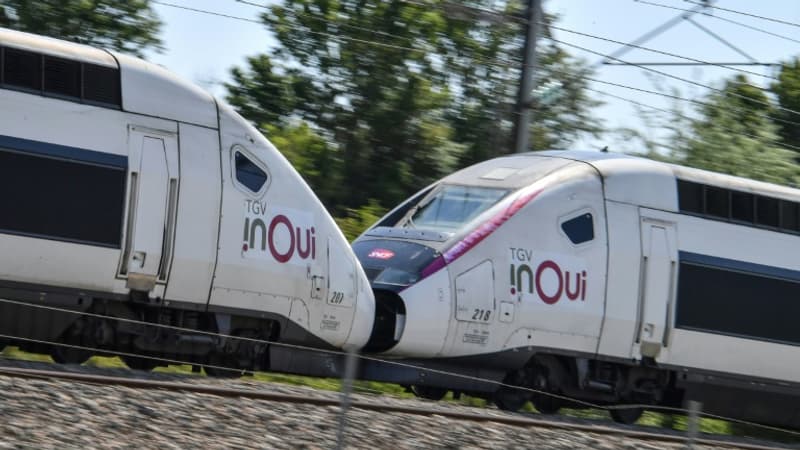Not a day goes by without controversy. More than ever, the SNCF is the subject of debate, controversy and fierce, often negative, comments in the media. It must be said that there is no shortage of issues that are sometimes exaggerated.
In the last few weeks alone, the railway company has had to fight to justify new rules on board its trains, such as the number and size of luggage that can be taken on board, the rejection of paper holiday vouchers, or even on this subject. famous 15-minute delay in settling into your seat… which sparked a certain excitement amplified by the chamber of reasoning on social networks.
The media, users and politicians often hold a grudge against the operator and do not hesitate to let them know it.
“A situation that is beginning to irritate the highest levels of the operator. A few days ago, Alain Krakovitch, director of TGV/Intercités, began to criticise the SNCF,” said the executive.
However, mistakes are common. Indeed, the latest “bad rumours” that the operator has suffered have sometimes been the result of extreme interpretations of regulatory developments by the SNCF.
Example with a 15-minute time limit. Obviously, it is extremely rare for a passenger to not take his seat on the TGV within the allotted time and then return from the bar car to find his seat occupied by another customer.
Obviously, the operator does not intend to time the installation time of each customer with the hidden objective of reselling seats considered empty or distributing tickets.
This is to facilitate the journey of customers who are on a train without a reservation (this happens when a connection is missed, for example). However, we only keep these 15 minutes of delay.
False controversies
The same applies to luggage. In absolute terms, transport conditions remain very generous on the train compared to those on the plane or coach (2 suitcases per person plus one piece of hand luggage).
The rules are designed to limit abuses – which are numerous – and to allow, for example, spaces for disabled people to be reserved appropriately for people in wheelchairs (and not for luggage or other bulky objects), in order to avoid security problems and improve punctuality.
However, we only take into account possible fines and commissions for controllers.
As Julien Joly, transport expert at Wavestone, sums up, these are “false controversies” that often contradict “good measures”.
On the other hand, SNCF’s communication is sometimes confusing. Often, the operator simply explains that these are clarifications but not regulatory changes, that in reality “nothing changes”.
However, the texts are evolving well, we are moving from a tacit framework to a much more precise framework written in black and white (baggage dimensions, for example, new terms and conditions for the term).
Hence the impression that new rules would emerge who knows where, which would be “hidden” from users and which would obviously give rise to new fines.
The truth is that companies often react to disputes retrospectively and in several stages.
Sometimes communication is lacking.
For example, with the 15-minute deadline, SNCF first indicated that it was simply a matter of applying a European regulation from 2021. Before explaining what the concrete objectives of such an approach were, and finally dismantling the misleading summary that was made (I lose my place if I don’t settle in within 15 minutes), notably through content on social networks.
As a result, the damage is often already done and the consequences are very negative in terms of image and perception by the general public.
This is also a situation that is affecting local unions such as Unsa-Ferroviaire (or rather the management). In the September issue of “Le Mag”, its internal magazine, the organisation asks: “What if they stopped for a bit?” “SNCF Bashing has been a national sport for many decades. Everyone gets involved, even those who have never set foot on a train.”
“The SNCF is considered a symbol of national identity and French culture, which still makes it a subject of media interest. Too often reluctantly integrated into political debates, the SNCF has become the property of all French people, many of whom consider themselves railway experts, most often without knowing anything about it,” we read.
Consequences for employees, the image of the SNCF and, ultimately, for the attractiveness of the train
While the union attempts to dismantle the sources of this ruthlessness by evoking instead successive reforms, employment policy or the social climate, it criticises the media for conscientiously avoiding “positive” topics that should “contribute to strengthening the company’s image and mitigating the negative effects of the attack on SNCF”. Media coverage of delays, train cancellations, strikes or accidents is much more attractive.
Enough to create a kind of vicious circle. “Constant and often virulent criticism of SNCF can also lead to a loss of user confidence, a drop in customer satisfaction and a reduction in passenger numbers on rail services. Thus, indirectly, SNCF Bashing has a downward influence on the company’s financial results, reducing its ability to attract new customers, maintain competitive prices and ensure its profitability,” Unsa believes.
Source: BFM TV


